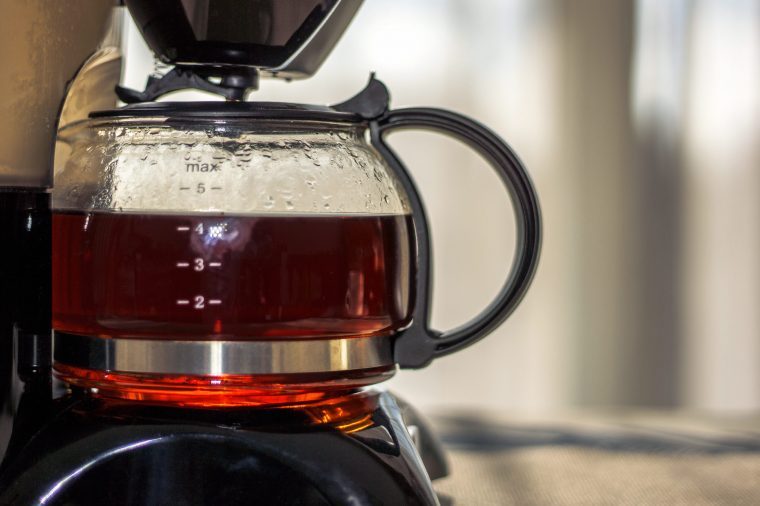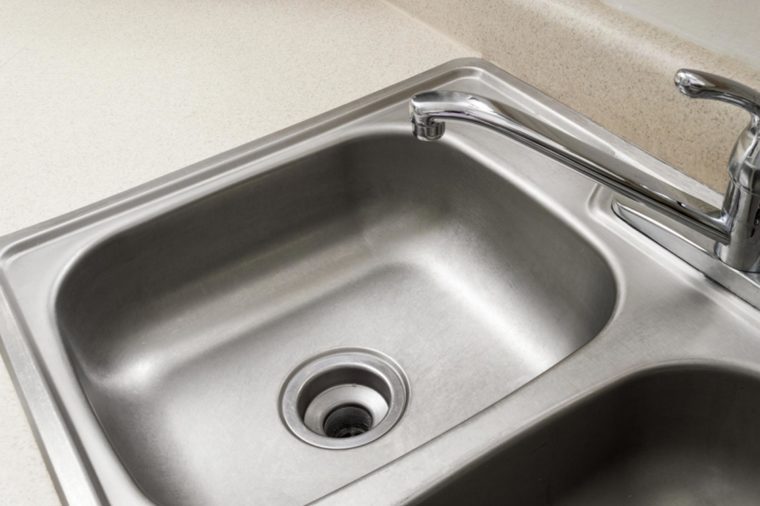CLEANING & ORGANIZING 11 Ways You Could Be Cleaning Your Kitchen Wrong Katie Askew ( courtecy;-reader's digest )
- লিঙ্ক পান
- X
- ইমেল
- অন্যান্য অ্যাপ
CLEANING & ORGANIZING
11 Ways You Could Be Cleaning Your Kitchen Wrong
Even if you clean your kitchen religiously, chances are you might be making a few of these crucial kitchen cleaning mistakes. These kitchen cleaning tips can help your kitchen smell better, make appliances last longer, and prevent germs from spreading among your family.
You overlook handles and knobs
 Kostenko-Maxim/Shutterstock
Kostenko-Maxim/Shutterstock
Your family touches handles on the fridge, microwave, and oven; door knobs; and kitchen cabinet pulls several times a day, so it’s no wonder these can get super germy. A 2013 study published in the journal Food Control found that various types of disease-causing bacteria, including listeria and E.coli, were detected on handles of doors, refrigerators, and dishwashers, for example, in 15 different houses. Make a habit of wiping down these oft-overlooked areas every night, says Debra Johnson, a Merry Maids national home cleaning expert. Don’t miss these other steps you should never skip when deep-cleaning your fridge.
You rarely clean your kitchen sink
 rawcaptured photography/shutterstock
rawcaptured photography/shutterstock
“There’s more E. coli in a kitchen sink than in a toilet after you flush it,” Charles Gerba, a microbiologist and professor at the University of Arizona in Tucson, told Food and Wine. Wet and dark, the sink is a perfect environment for bacteria to thrive; worse, germs can spread to items left to accumulate there. Use a mild soap and warm water to wipe down your sink’s basin with a clean sponge after a dish washing session. Don’t miss these other cleaning mistakes that leave your house germy.
You neglect your coffee maker and grinder
 istock/yipengge
istock/yipengge
You probably use these appliances far more than you clean them. But a grimy coffee maker or grinder can affect the taste of your java. Run two parts water to one part distilled white vinegar through the brew cycle without a filter about once a month, says Johnson. Then rinse with a few rounds of water until you can’t smell the vinegar any more. To clean the grinder, wipe down with a wet cloth and soapy water. Then pulverize uncooked rice to pick up any lingering smells. Find out how to clean 17 other tricky-to-wash items.
You don’t freshen up the garbage disposal
 Carolyn Franks/shutterstock
Carolyn Franks/shutterstock
It may seem like your garbage disposal magically, well, disposes of all your food remnants, but little chunks of food can remain behind (similar to how your blender’s blades get tiny pieces stuck on them), which means it can get smelly. Try one of these two home cleaners: white vinegar and ice cubes or citrus rinds and cold water, recommends Martha Stewart Living. Toss either combo down the drain after a big dinner, then turn on the processor until it’s cleared. Hello, fresh-smelling sink. Check out these other 15 ways to clean with lemons instead of chemicals.
You put sharp knives in the dishwasher
 iStock/max2611
iStock/max2611
Sharp knives—especially those with wooden handles—shouldn’t go in the dishwasher. Each wash dulls and takes years off the knife. (Your dishwasher likely cleans with far more power than the knife needs). Hand wash knives (excluding those from your silverware) to prolong their longevity and keep their sharpness. Here are more mistakes you make when loading the dishwasher.
You rely on your oven to clean itself
 ESstock/Shutterstock
ESstock/Shutterstock
The self-cleaning feature may actually damage your oven, appliance expert Aaron Dahl told thekitchn.com. Because the oven’s heating elements are placed well within the appliance, it’s much harder to ventilate properly given the extreme (1,000°F or higher) temperatures used to self-clean. This can lead to popped fuses or burnt-out control panels. You might save time, repairs, and electricity by cleaning out the inside of your oven yourself. Spray the inside with an all-purpose cleaner and let it sit overnight. In the morning, wipe away all the grime and black spots. To ensure racks get clean, place them inside a large garbage bag, spray with the same cleaner, then let them sit overnight. The next morning you’ll just need to rinse with warm, soapy water and wipe dry. To prevent spills going forward, Johnson suggests covering the bottom of the oven with a disposable (oven-safe) liner to catch spills. Don’t miss these other 38 things housecleaners want you to know.
You didn’t realize your reusable grocery bags needed a cleaning
 istock/Yuri_Arcurs
istock/Yuri_Arcurs
Reusable bags are great for the environment, but they can be germ magnets. According to a 2012 University of Pennsylvania study, the city of San Francisco saw a rise in emergency department visits (due to food poisoning) following the city’s ban on plastic grocery bags. While the study can’t prove that the reusable bags were the only factor, other research indicates they do harbor disease-causing bacteria. A joint research report from the University of Arizona and Loma Linda University in California found E. coli on more than half of reusable bags sampled. Even worse: 97 percent of the study participants interviewed never thought to wash or sanitize their reusable bag. Wrap raw meat in a plastic bag before putting it in your reusable one to prevent leakage. Never use these bags for anything other than groceries to prevent cross-contamination. To clean then, turn them inside out and spray with an all-purpose cleaner; let the bags air dry. Check out these other 11 spots you always forget to clean.
You never remove your removable stove burners
 sachek/ShutterStock
sachek/ShutterStock
The stovetop is one of the greasiest zones in your kitchen. If your range has removable burners, don’t waste energy (and sponges) scrubbing them to death. The V Spot blogsuggests placing each burner in a sealed zip-top bag and adding ¼ cup of ammonia. Let the bag sit on a baking sheet overnight and wipe the burner clean the next morning with a sponge. (FYI: Never mix bleach and ammonia because it creates toxic fumes). Still not spotless? Let the burner soak in warm, soapy water to further loosen any stuck-grime, then wipe away after a few hours.
You never clean the inside dishwasher door
Cue the ick factor: According to a 2011 study of 189 household dishwashers, more than 60 percent contained some kind of fungi on the rubber seal around the appliance door and more than half harbored black yeast. While the odds of your getting sick from these microbes are slim, it’s still a good idea to give your dishwasher a thorough cleaning. Use a regular spray cleaner and a small brush to get into the grooves of the rubber. To sanitize your entire dishwasher, layer of coating of 1 part white vinegar and 1 part water from a spray bottle on the inside walls and rungs in the machine. Run the machine on empty (don’t put any detergent in) on the hottest wash cycle to rinse and freshen the whole washer. Here are 17 more dirty spots you never think to clean.
You clean your floors first
 mmphotographie.de/Shutterstock
mmphotographie.de/Shutterstock
Do you vacuum or mop your floors before wiping down counters and cabinets? You’re making more work for yourself (because dust and crumbs from the counter will fall to the floor, making it dirty all over again). Merry Maids’ Johnson recommends a top-down cleaning pattern: dust shelving and cabinets first, then clean countertops, and finally vacuum the kitchen floor, then wipe with dry mop to ensure a truly dust- and crumb-free kitchen. Here are 11 more cleaning shortcuts lazy people need to know.
Your water-filtering pitcher hasn’t seen soap in months
 Africa Studio/Shutterstock
Africa Studio/Shutterstock
Even though your water-filtering pitcher holds only water, bacteria and algae can grow, especially if you keep your water pitcher on the counter instead of in the fridge. Take apart all the pieces of the pitcher and wash each with warm, soapy water each week. (Some pitchers are dishwasher safe; check the manual to see if you can wash yours there). Let the pitcher completely dry, then reassemble. Don’t miss these 18 organization mistakes that make your kitchen look sloppy.
Sources: thekitchn.com, huffingtonpost.com, emlii.com, housebeautiful.com, Merry Maids Cleaning Services specialist, sciencedirect.com, foodandwine.com, marthastewart.com.
- লিঙ্ক পান
- X
- ইমেল
- অন্যান্য অ্যাপ

মন্তব্যসমূহ
একটি মন্তব্য পোস্ট করুন